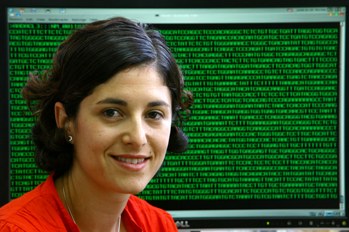| | 26 June, 2008
| | Study opening new route for combating viruses wins Barenholz Prize for Hebrew University Ph.D. student | |
 | | Kaye Award winner Naama Elefant with a computer screen of DNA sequence in the background. (Photo: Sasson Tiram) |
|
A unique technique for analyzing the function of microRNAs developed by a Hebrew University of Jerusalem doctoral student has led to the discovery of a new mechanism by which viruses evade the human immune system. This discovery has important implications for human intervention in the battle between viruses and humans.
For her work in this field, Naama Elefant, a student of Prof. Hanah Margalit of the Faculty of Medicine at the Hebrew University and an Azrieli fellow, was named one of this year’s winners of the Barenholz Prizes for Creativity and Originality in Applied Computer Science and Computational Biology. The prizes were awarded on June 4 during the 71st meeting of the Hebrew University Board of Governors. This discovery also was declared by the magazine Nature Medicine as ''one of the ten notable advances of the year 2007.''
MicroRNA genes are a class of very tiny genes found in a variety of organisms. First discovered in 1993 and at the time considered relatively unimportant, they are now recognized as major players in diverse biological processes.
MicroRNAs are important regulators of protein production. Proteins, the building blocks of the cell, must be produced precisely at the right time and place. MicroRNAs specifically latch on to other genes (their targets) and inhibit the production of the protein products of these genes. Hundreds of microRNAs have already been discovered, but the identity of their target genes remains mostly unknown and presents a great challenge in the field.
Elefant developed a computer algorithm that predicts the targets of microRNAs. Her algorithm, named RepTar, searches the thousands of genes in the human genome and through sequence, structural and physical considerations detects matches to hundreds of microRNAs.
The uniqueness of this technique allowed her to research an interesting group of microRNAs originating in viruses. The presence of microRNAs in viruses raised the intriguing possibility that upon viral infection of a host cell, the virus may use microRNAs as weapons in its battle against the host, inhibiting the production of important host proteins.
Indeed, Elefant’s algorithm predicted that an immune system protein, essential for the immune system’s response against viruses, is inhibited by a viral microRNA. This prediction was confirmed in collaboration with the laboratory of Prof. Ofer Mandelboim of the Hebrew University Faculty of Medicine, who demonstrated experimentally that the microRNA aids the virus in evading the immune system. This study showed for the first time that a viral microRNA inhibits the activity of a gene of the human immune system, placing microRNAs as important players in the battle between viruses and humans.
The discovery holds promising therapeutic implications. It opens a new direction for anti-viral therapy aimed at inhibiting the viral microRNA, and it introduces a possible means to suppress the immune system in autoimmune diseases and transplantations by developing synthetic microRNAs that will mimic the action of natural microRNAs.
The Barenholz Prize is named for its donor, Yehezkel Barenholz, the Dr. Daniel G. Miller Professor of Cancer Research at the Hebrew University-Hadassah Medical School.
|
Downloadable File: elefant.doc |
|


